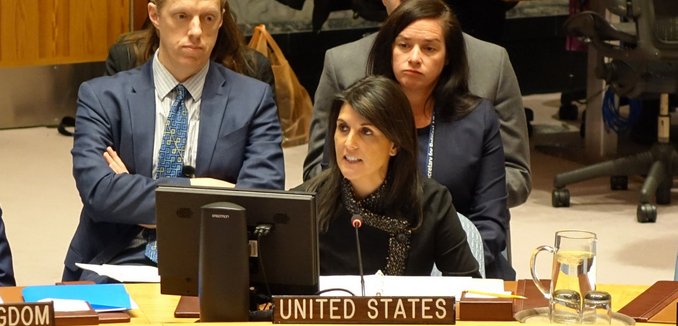Despite “overwhelming evidence” presented in recent weeks by a United Nations panel of experts demonstrating that Iran has not prevented the transfer of arms to the Houthi rebels in Yemen, Russia’s veto “protected the terrorist-sponsoring regime in Iran,” Nikki Haley, the United States Ambassador to the United Nations said in a statement Monday.
Eleven of the 15 states on the council voted in favor of the condemnation, however, Russia was able to veto the resolution with its vote as it is one of the five permanent member of the Security Council. A second permanent member of the council, China abstained from the vote.
Haley suggested that in light of the Security Council’s failure to hold Iran responsible for its refusal to observe the boycott of the Houthis, that the U.S., together with allies, could conceivably take action against Iran to punish the Islamic Republic.
“If Russia is going to use its veto to block action against Iran’s dangerous and destabilizing conduct,” Haley said, “then the United States and our partners will need to take actions against Iran that the Russians cannot block.”
The UN panel that examined rocket fragments that had been recovered from Saudi Arabia found that they had markings showing that they had been manufactured in Iran. The transfer of arms by Iran to the Houthi violates the embargo place on the Houthis, it also violates UN Security Council 2231, which implemented the nuclear deal.
Iran, according to Resolution 2231, is prohibited from “the supply, sale, transfer, manufacture, maintenance, or use of arms” to other parties until 2020. According to the resolution, Iran is also specifically prohibited from the sale or transfer of ballistic missiles until 2023.
Earlier in the week, Haley blasted the United Nations Human Rights Council for allowing Iran’s Minister of Justice, Seyyed Alireza Avaei to address it. According to a statement released by Haley, Avaei “is responsible for some of the worst human rights violations in Iran, including preventing political freedoms and promoting repression, violence, and extrajudicial killings of political prisoners.” Having him address the council, Haley said, “discredits” the council “by allowing serial human rights abusers to hijack its work.”
[Photo: U.S. Mission to the United Nations / Facebook]




